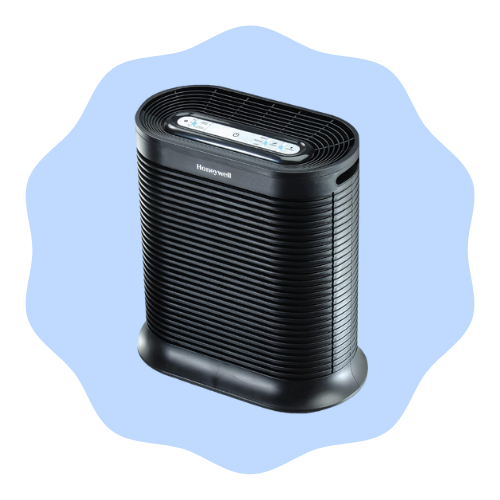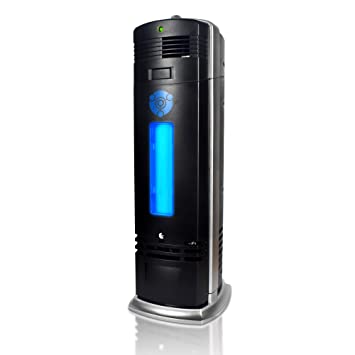Are you looking to know the distinction between a HEPA air purifier and an ionizer (or ionic air purifier)?
Although both products emit fresh, clean air, they do so in entirely distinct ways. Depending on If you want to know whether it’s worth investing in a home air cleaner, the first question is why you want one in the first place. The answer will determine if you should purchase a HEPA air purifying device or an ionizer.
Here’s what you came for – an explanation of the different types of air purifiers and how they work to cleanse your environment.
Air Purifier vs Ionizer
A HEPA air purifier sucks in airborne contaminants like dust, allergens, mold spores, bacteria, and smoke through a dense physical filter. An ionizer sends out electrically charged ions that bond with harmful impurities in the air.
What Is a HEPA Air Purifier?

A HEPA air purifier is a mechanical device that uses a filter to remove impurities from the air.
The filter is made of very fine mesh that captures particles as small as 0.3 microns. To give you an idea of how small that is, human hair is about 70 microns in diameter. So, a HEPA filter can remove very small particles from the air that you breathe.
That’s what sets a HEPA filter apart from the competition. It’s not only the finest allergy air filter but also the finest air filter for asthma and mold. The highest grade of HEPA filter, in fact, can capture up to 99.97% of particles as small as 0.3 microns, ensuring that you are breathing clean air free of the most harmful pollutants.
What Is an Ionizer (or Ionic Air Purifier)?

An ionizer (or ionic air purifier) is an electronic device that uses charged ions to remove impurities from the air. The ions attach themselves to particles in the air, such as dust, pollen, and smoke. The ions make the particles heavier so that they fall to the ground and are no longer airborne.
HEPA filters can only attack particles that are up to 0.3 microns, but ionizers can go down to 0.1 microns. However, it is possible for the particle-free environment to be disturbed when people or pets move around the room or touch surfaces since there’s always a chance the particles will be stirred back into the air again.
The continuous cycle of impurities being removed from the air and then returning to it is caused by the fact that particles are not taken out of the room. This is one of the reasons why we don’t recommend ionizers for individuals who suffer from respiratory issues such as asthma (because the particles aren’t collected).
The clear advantage that a HEPA air purifier has over an Ionizer is that the HEPA unit actually captures airborne contaminants and prevents them from recirculating into the air.
What’s the difference between a HEPA air purifier and an ionizer (or ionic air purifier)?
HEPA filters work by physically trapping particles as they pass through the filter, while ionizers emit charged ions that attach to particulates in the air, causing them to drop to the ground.
An ionic air purifier uses a fan to draft in outside air. The air then crosses a set of metal plates that have an electrical current running through them. Because opposite charges attract, the pollutants are drawn to and stick to the plates. This is distinct from how a HEPA filter works, which instead captures particles on a mesh filter
An ionic air purifier cleans the air by using electrostatic collection plates that can be reused after they become dirty. A HEPA air purifier uses a filter that must be replaced when it becomes clogged.
Furthermore, HEPA air purifiers are more adept at capturing pollutants as time goes on. This is because the material is a collection of fibers that are much denser than other materials.
If the metal plates on your ionic air purifier become dirty, it’s not as effective because other pollutants will cover the electrically charged surface. Therefore, you should clean it regularly.
Lastly, a side-effect of electrically charging the metal plates is that it emits small levels of ozone. The same goes for ionizers that release charged ions into the room; however, they are mostly safe for people to be around as our article “are ionizers safe?” will explain.
Although research has revealed that “no data showed the harmful effects of NAIs [negative air ions] on humans/animals,” some people with respiratory conditions can still experience lung irritation from ionizers and ionic air purifiers if they produce ozone in trace amounts.
Choose a HEPA air filter purifier if you have respiratory conditions such as asthma, COPD, bronchitis, or emphysema because these units provide no negative side effects. And if you were wondering whether air purifiers make you ill in any other way (i.e., sore throat, cough, or nosebleed), the answer is no.
The difference in Maximum Area Coverage
Because a HEPA air purifier relies on a physical filter, it can cover a smaller area than an ionizer.
The AIRMEGA 400 is the most powerful air purifier with a HEPA filter that we’ve seen for sale, and it can effectively cleanse an area of 1,560 square feet.
Although this is enough for most home uses, it may not be sufficient for a large company space. Visit our top 10 air purifiers page to learn more about it.
Some ionizers can purify up to 3,500 sq. ft., which is a large space that can accommodate even the biggest homes or businesses.
When it comes to air ionizers that utilize a metal filter to trap pollutants, they tend to reach their capacity limits at 500 square feet. Because an ionic air purifier needs a fan to draw the air through the system, and the electrostatic collection rods can only be so big, this is the case.
The Envion Ionic Pro is an excellent ionic air purifier for residential use. To learn more about this item and other options, go to our best ionic air purifier reviews page to learn all of the information.
Air Ionizer vs Air Purifier Summary
We hope you found this article on the distinctions between a HEPA air purifier and an ionizer useful.
A HEPA air purifier can be more effective in removing pollutants from the air since it actually captures the particles in a physical filter. An ionizer, on the other hand, does not remove any pollutants from the air you breathe, but it does cause them to fall out of the atmosphere.
An air ionizer is a type of air purifier that uses charged metal plates to remove pollutants from the air. A HEPA air purifier, on the other hand, uses a physical filter to capture particles as they pass through the unit. Ionic air purifiers are more effective at cleaning large spaces than HEPA units.
When it comes to an ionic air purifier vs a HEPA air purifier, the ionic air purifier works similarly to a HEPA air purifier except that it utilizes charged plates to collect pollutants. These metal plates may be washed and reused as pollution fills them up. When compared with a HEPA filter, ionic air purifiers are more cost-effective, however, they do not cover as much area overall.